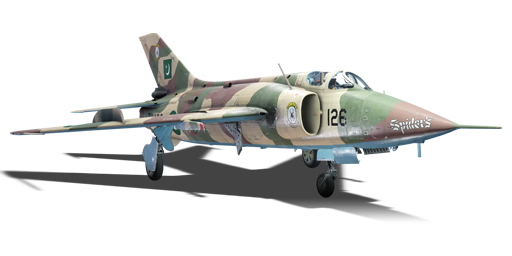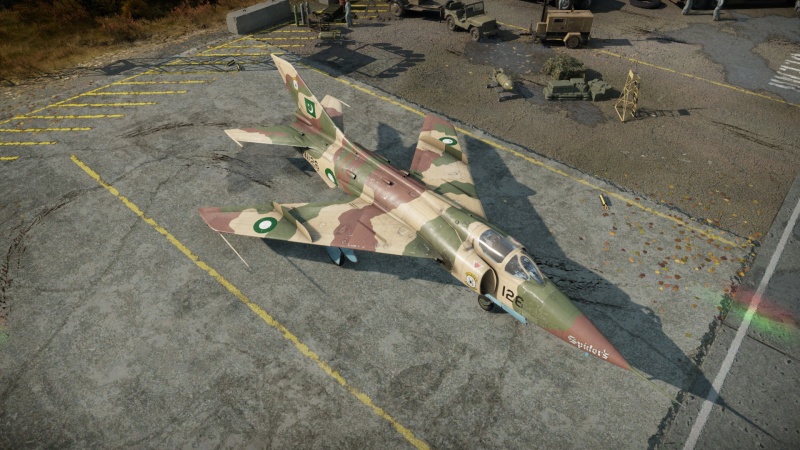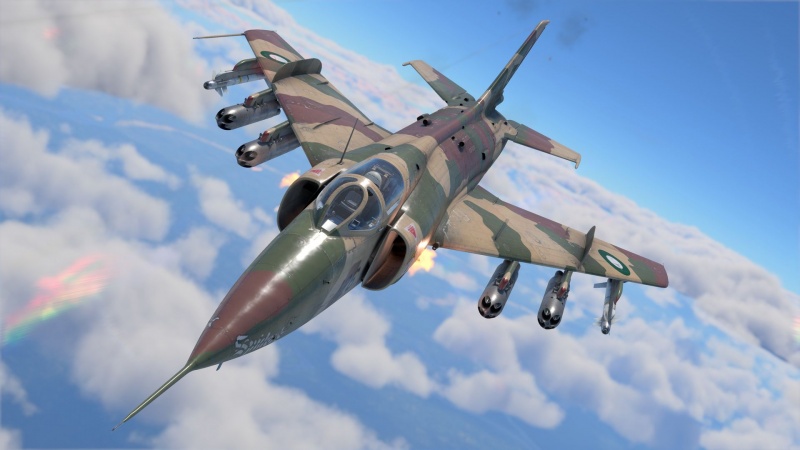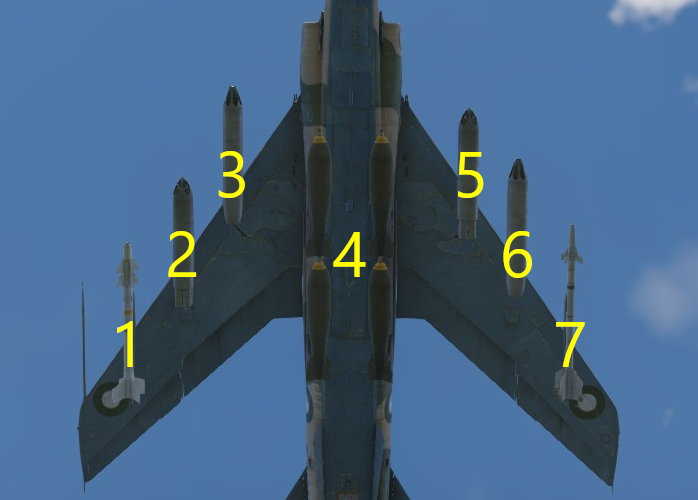Difference between revisions of "A-5C"
tacotastic13 (talk | contribs) m (Tag: Visual edit) |
Colok76286 (talk | contribs) (Edits) |
||
| Line 241: | Line 241: | ||
* The 4 x 500 lb bombs drop separately | * The 4 x 500 lb bombs drop separately | ||
* The Type 90-1 rockets have sufficient penetration against MBT weakspots and light vehicles | * The Type 90-1 rockets have sufficient penetration against MBT weakspots and light vehicles | ||
| − | * | + | * CCIP for gun, rockets and bombs |
'''Cons:''' | '''Cons:''' | ||
Revision as of 08:02, 10 November 2022
| This page is about the Chinese strike aircraft A-5C. For other versions, see Q-5 (Family). |
Contents
Description
The A-5C is a premium gift rank VI Chinese strike aircraft with a battle rating of 10.7 (AB/RB/SB). It was introduced in Update "Direct Hit".
Sharing most of the performance and appearance of a Q-5A, A-5C comes with AAMs and Western bombs which might be more familiar to players of the western countries. With its excellent climb rate as an attacker, a pair of advanced AAMs, and somewhat superior manoeuvrability to enemies at similar BR, it can still prove deadly to enemies at even higher BR, surprising them with what a MiG-19-based aircraft can do.
General info
Flight performance
| Characteristics | Max Speed (km/h at 7,000 m) |
Max altitude (metres) |
Turn time (seconds) |
Rate of climb (metres/second) |
Take-off run (metres) | |||
|---|---|---|---|---|---|---|---|---|
| AB | RB | AB | RB | AB | RB | |||
| Stock | 1,438 | 1,434 | 17000 | 25.4 | 25.7 | 139.8 | 130.0 | 900 |
| Upgraded | 1,458 | 1,447 | 24.6 | 25.0 | 186.2 | 162.0 | ||
Details
| Features | |||||
|---|---|---|---|---|---|
| Combat flaps | Take-off flaps | Landing flaps | Air brakes | Arrestor gear | Drogue chute |
| X | ✓ | ✓ | ✓ | X | ✓ |
| Limits | ||||||
|---|---|---|---|---|---|---|
| Wings (km/h) | Gear (km/h) | Flaps (km/h) | Max Static G | |||
| Combat | Take-off | Landing | + | - | ||
| 1,260 | 577 | N/A | 500 | 450 | ~9 | ~5 |
| Optimal velocities (km/h) | |||
|---|---|---|---|
| Ailerons | Rudder | Elevators | Radiator |
| < 540 | < 650 | < 350 | N/A |
Engine performance
| Engine | Aircraft mass | ||||||
|---|---|---|---|---|---|---|---|
| Engine name | Number | Basic mass | Wing loading (full fuel) | ||||
| Shenyang Liming WP-6A-III | 2 | 6,712 kg | 341 kg/m2 | ||||
| Engine characteristics | Mass with fuel (no weapons load) | Max Takeoff Weight | |||||
| Weight (each) | Type | 10m fuel | 20m fuel | 30m fuel | 34m fuel | ||
| 725 kg | Afterburning axial-flow turbojet | 7,560 kg | 8,329 kg | 9,138 kg | 9,539 kg | 12,000 kg | |
| Maximum engine thrust @ 0 m (RB/SB) | Thrust to weight ratio @ 0 m (WEP) | ||||||
| Condition | 100% | WEP | 10m fuel | 20m fuel | 30m fuel | 34m fuel | MTOW |
| Stationary | 2,651 kgf | 3,706 kgf | 0.98 | 0.89 | 0.81 | 0.78 | 0.62 |
| Optimal | 2,679 kgf (1,000 km/h) |
3,783 kgf (1,000 km/h) |
1.00 | 0.91 | 0.83 | 0.79 | 0.63 |
Survivability and armour
- 10 mm steel plate behind nose cone
- 60 mm bulletproof glass in cockpit front
- 8 mm steel plate underneath cockpit
- 25 mm steel armoured pilot's seat
- 10 + 16 mm steel armoured pilot's headrest
- Self-sealing fuel tanks behind cockpit and underneath engines in rear fuselage
The A-5C protects the pilot from small arms fire, but against the armaments encountered at the battle rating, this level of protection does not amount to much. Enemy cannons and missiles will make short work of the A-5C so avoiding incoming fire is paramount. The twin engines are likely to be damaged by attacks from the rear, but having two of them offers some extra survivability since it is capable of flying back to base on one engine. The aircraft also remains somewhat controllable if one of the elevators is blown off.
Modifications and economy
Armaments
| Ballistic Computer | |||
|---|---|---|---|
| CCIP (Guns) | CCIP (Rockets) | CCIP (Bombs) | CCRP (Bombs) |
| |
|
|
|
Offensive armament
The A-5C is armed with:
- A choice between two presets:
- 2 x 23 mm Type 23-2K cannons, wing-mounted (120 rpg = 240 total)
- 2 x 23 mm Type 23-2K cannons + 18 x countermeasures
The A-5C is equipped with 23 mm cannons identical to the NR-23 cannons found on earlier Soviet jets like the J-4/MiG-17. These are significantly less powerful than the contemporary J-6A's Type 30/NR-30 cannons due to their lower explosive content, kinetic damage, and muzzle velocity. They typically require a solid burst of hits to destroy a target instead of dismembering enemy fighters with a brief touch. On the bright side, they have more ammunition with about 8 seconds of firing time. Lead generously and try to get close to your opponent before unloading. Using them against ground targets should not be a priority since their penetration is no higher than a heavy machine gun and the ammo supply is not plentiful.
The default belt has an even mix of FI-T and AP-I rounds and should be satisfactory from the start. Gun convergence is not a major issue since the cannons are mounted close to the centerline of the aircraft in the wing roots, and is up to personal preference.
Suspended armament
The A-5C can be outfitted with the following ordnance presets:
- Without load
- 2 x AIM-9P Sidewinder missiles
- 2 x Matra R550 Magic 1 missiles
- 28 x Type 90-1 rockets
- 16 x Type 130-2 rockets
- 4 x 500 lb LDGP Mk 82 bombs (2,000 lb total)
- 4 x 750 lb M117 cone 45 bombs (3,000 lb total)
- 2 x Matra R550 Magic 1 missiles + 28 x Type 90-1 rockets + 4 x 500 lb LDGP Mk 82 bombs (2,000 lb total)
- 2 x Matra R550 Magic 1 missiles + 16 x Type 130-2 rockets + 4 x 750 lb M117 cone 45 bombs (3,000 lb total)
- 2 x AIM-9P Sidewinder missiles + 28 x Type 90-1 rockets + 4 x 750 lb M117 cone 45 bombs (3,000 lb total)
- 2 x AIM-9P Sidewinder missiles + 16 x Type 130-2 rockets + 4 x 250 kg Type 250-2 bombs (1,000 kg total)
Custom loadout options
| 1 | 2 | 3 | 4 | 5 | 6 | 7 | ||
|---|---|---|---|---|---|---|---|---|
| 250 kg Type 250-2 bombs | 4 | |||||||
| 500 lb LDGP Mk 82 bombs | 4 | |||||||
| 750 lb M117 cone 45 bombs | 4 | |||||||
| Type 90-1 rockets | 7 | 7 | 7 | 7 | ||||
| Type 130-2 rockets | 4 | 4 | 4 | 4 | ||||
| AIM-9P Sidewinder missiles | 1 | 1 | ||||||
| Matra R550 Magic 1 missiles | 1 | 1 |
Usage in battles
Although historically an attack aircraft, the A-5C is not a first-rate ground attacker in Air RB since its ordnance is rather anaemic compared to other jets at its battle rating. It cannot destroy a base with its four 250 kg/500 lb bombs, but this is still an option for supplementary research points when grinding: stay at low altitude, loop around to a side base, drop the bombs, then head towards the center of the map to join the furball. Going after AI ground vehicles with the bombs and rockets can also be successful provided that other jets do not arrive quickly to crash the party.
The A-5C can outrun many of the enemy fighters it faces, but active combat at transonic or supersonic speeds should be avoided because of the control compression. The best way to reverse enemies is to pull them into a climbing spiral or other vertical manoeuvres; the A-5C has enough of the MiG-19's climb and thrust-to-weight characteristics to energy fight in a similar manner, the declining airspeed relaxes the control compression, and a stalled-out target is easier to gun down. It should be obvious that actual MiG-19 models such as the German MiG-19S are better than the A-5C in almost every regard when it comes to air-to-air combat. Be very careful about engaging them.
When diving, pay close attention to your airspeed, as the A-5C has tendency to rip wings if you are approaching the ground at over Mach 1.0. If you need to, use the airbrake and pull up gently to reduce the control compression. Do not use afterburner or high levels of throttle in a low-altitude dive, the airbrakes are effective enough to stop you from ripping your wings but they work best in horizontal turns and not in dives, especially with thrust being applied at the same time.
While its Chinese cousins lacked any form of AAM for self-defense, the A-5C comes with a pair of AIM-9Ps or Matra R550 Magics which prove very deadly at the BR. The AIM-9P can cause extensive damage to the enemy team at range and the Magic is a potent AAM which can easily terminate any target within a 2 km radius. So bringing 2 of them solely for dogfights or as self-defense is the way to go.
The RWR will not stop any missiles by itself, but knowing if there are pursuers or radar locks behind you reduces the chance of being surprised by a missile or cannon burst out of nowhere. The RWR is not a replacement for situational awareness, it is still the pilot's duty to look for approaching enemies and missile launches whenever possible. While A-5C comes with countermeasures, it has only 18 of them - only sufficient for one or two near misses from enemy missiles, so evade enemy missiles with manoeuvres for the best result and only spend your flares as a last ditch measure to save yourself.
Ground RB
The A-5C is a light ground attacker whose rockets are limited in capacity and whose bombs are limited in power. It's generally best to use up the rockets and bombs in one or two passes, then switch to providing air cover. If there are no enemy aircraft or helicopters around, the A-5C can quickly zoom back to the airfield and restock its weapons for another run. Since the A-5C has CCIP capabilities, pilots can drop ordnance onto enemy positions or vehicles with pinpoint accuracy.
The A-5C has 90 mm HEAT rockets, which can be used successfully from many angles provided that enough hits are landed to knock out crew members thanks to the ballistic computer. The use of the A-5C's variety of rocket loadouts is highly viable, because the stand-off distance given with the ability to shoot them from over a kilometre away gives the pilot a upper hand in surviving encounters with enemy AA vehicles.
The 500 lbs bombs, which are dropped individually, do not have much explosive filler and need to be delivered with decent accuracy in order to score kills. This can be a tall order for a supersonic jet aircraft like the A-5C, especially against moving targets, so consider dropping several (or even all of them) at once. Carpet bombing a capture point or street can lead to decent results. A short fuse can be used due to the bombs' limited blast radius. For those familiar with the Q-5s, keep in mind that they carried high-drag bombs, meaning that you had to be really close to your targets before dropping them; these low-drag Mk.82 bombs should be easier to use.
The A-5C's radar warning receiver can help detect SPAA vehicles, but be sure to visually inspect the battlefield as well. Some players turn off their radars for greater stealth and some SPAAs lack radars entirely. The majority of SAMs are manually guided by their operators and thus flares will not work against them; the main exceptions are the Japanese Type 93 and the Italian SIDAM 25 (Mistral). Do not head-on or stall out in full view of an SPAA, and even when the coast appears to be clear, avoid flying in straight lines.
Evading IR Missiles
The A-5's engines produce a somewhat large heat signature compared to other aircraft at its BR, in some cases even if you shut your afterburner off and try to flare/bank away from the missile, it will ignore the flares outright and go right for your engines. At high speeds, your elevators and ailerons compress significantly, preventing you from evading the missile even if you expend all 18 flares on a single missile.
In order to evade some more-flare-resistant missiles such as the AIM-9L, a good strategy is to shut off your engines completely or reducing your throttle to 0% so your heat signature is reduced significantly, drop a flare or two, then fire up your engines again and speed off. Do not attempt to aggressively bank while your engines are off or still warming up, as you could bleed enough speed to allow whoever fired the missile at you a chance to get their guns locked on you. Once your engines are up to temperature again and producing maximum thrust, then you can bank to try to evade any future missile, this best works against slower targets like the A-10 or Su-25 which both carry 30G all-aspect AAMs of the Aim-9L and R-60M/MK respectively. Avoid trying this tactic against jets like the F-4C or MiG-21s, as they can catch up to you at lower altitudes, especially at speeds approaching Mach 1.
Pros and cons
Pros:
- High acceleration, great energy retention, and decent climb rate
- Good ammunition stock
- Good sustained manoeuvrability, can out-turn F-4 Phantoms and keep up with MiG-21s
- Has a radar warning receiver, useful against high tier SPAAs
- Comes with excellent AIM-9P or R550 Magic missiles as self defense weaponry
- The 4 x 500 lb bombs drop separately
- The Type 90-1 rockets have sufficient penetration against MBT weakspots and light vehicles
- CCIP for gun, rockets and bombs
Cons:
- Average roll rate, much slower than shorter-winged opponents such as Yak-38 and Jaguar
- Rudder and elevators lock up at high speeds (>1000 km/h)
- The 23 mm cannons sometimes fall short in damage, much less lethal than J-6A's 30 mm cannons
- Ordnance capacity is still below average for its rank
- The amount of flares is quite limited
History
In view of the economy after the Cultural Revolution and the dawn of the economic reform in Mainland China, the Central Government decided that all exported weapons would be priced and handled by the newly established CATIC. In mid-1979, Egypt became their first overseas customer with orders of new jets and engines; meanwhile, Pakistan had concluded that the main culprit for the lost of 3rd Indo-Pakistan War was because of the lack of a dedicated ground attacker, in fear of possible assaults from USSR via Afghanistan, they were in dire need for a new ground attacker.
Pakistan then sent 2 teams of staffs to Nanchang Aircraft Corporation and it was concluded that Q-5 would be a fair option for an attacker with its low-altitude performance and price, but it would also be upgraded with Western avionics, weaponries and came with IR AAMs for self-defense. Based on the Q-5IA that was still under development, Nanchang Aircraft Corp. built 3 prototypes in 1982 and the newly designated A-5C was delivered to the PAF from early 1983 to 1984, with 54 of them built through out the year.
A-5C was then delivered to three different PAF squadrons and some of them retired as early as 1991, while the remaining were kept in commission until mid-2011, when the more-advanced JF-17 Thunder replaced them as a multi-role fighter. Other export variants remain in service at Myanmar and Sudan.
Media
- Skins
- Videos
See also
- Related development
External links
| Nanchang Aircraft Manufacturing Corporation 南昌飞机制造公司 | |
|---|---|
| Strike aircraft | Q-5 early · Q-5A · Q-5L |
| A-5C | |
| China jet aircraft | |
|---|---|
| Fighters | J-2 · J-4 · J-6A · J-7II · J-7D · J-7E · J-8B · J-8F · J-10A · J-11 · J-11A |
| Strike aircraft | Q-5 early · Q-5A · Q-5L · JH-7A |
| Bombers | H-5 |
| France | ␗Mirage 2000-5Ei |
| USA | ␗F-84G-21-RE · ␗F-84G-31-RE · ␗F-86F-30 · ␗F-86F-40 · ␗F-100A · ␗F-100F · ␗F-104A · ␗F-104G · ␗F-5A · ␗F-5E · ␗F-16A MLU |
| USSR | ␗MiG-9 · ␗MiG-9 (l) |
| North Korea | Shenyang F-5 |
| Pakistan | A-5C · JF-17 |
| China premium aircraft | |
|---|---|
| Fighters | ␗A6M2 · D.510C · ␗F-47N-25-RE · H-81A-2 · Hawk III · ␗Ki-45 hei/tei · ␗Ki-84 ko · ␗P-51C-11-NT |
| Jet fighters | Shenyang F-5 · J-7D |
| Strike aircraft | A-5C · ␗F-84G-31-RE |







